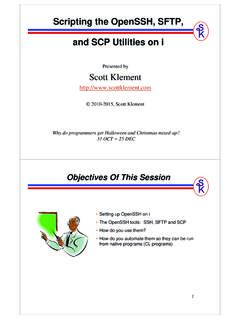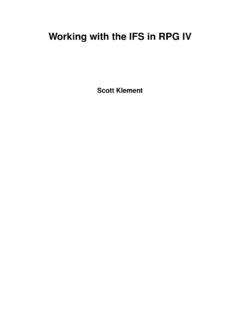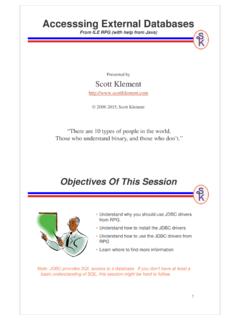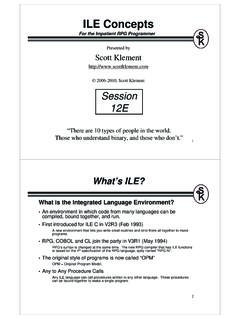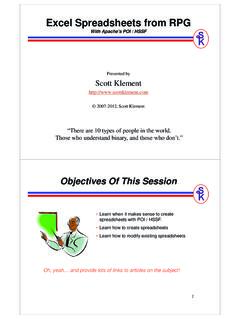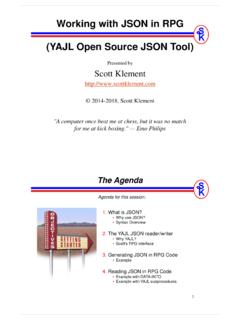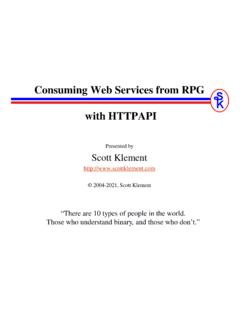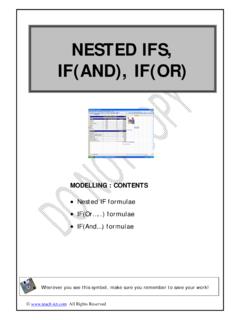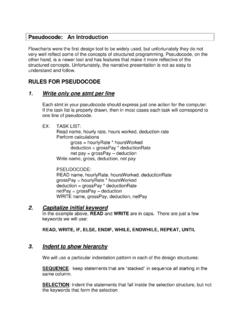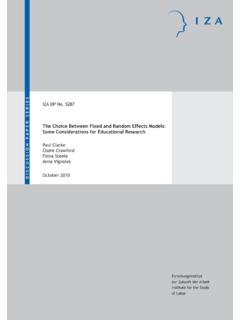Transcription of Sgl - Working with JSON in RPG - Scott Klement
1 Working with json in RPGP resented byScott 2014-2018, Scott Klement "A computer once beat me at chess, but it was no match for me at kick boxing." Emo Philips(YAJL Open Source json Tool)2 The is json ? Why use json ? Syntax YAJL json reader/writer Why YAJL? Scott 's RPG json in RPG Code json in RPG Code Example with DATA-INTO Example with YAJL subproceduresAgenda for this session:3 Ugggh, Another Thing to Learn!This is pretty much how I felt about json at first! ugggh, I just learned XML. Do I need to learn something new?! But, as I learned more, I started to love it. Now I much prefer json over Like XMLJSON is a format for encapsulating data as it's sent over networksMuch Like is self-describing (field names are in the data itself) and Like XMLVery popular in Web Services and AJAX Much Like XMLCan be used by all major programming languagesMuch Like XMLSo why is it better than Different Than XMLJSON is simpler: only supports UTF-8, whereas XML supports a variety of encodings.
2 Doesn't support schemas, transformations. doesn't support namespaces method of "escaping" data is much is faster more terse (less verbose). About 70% of XML's size on average simpler means faster to parse dead simple to use in JavaScript6 json is Quickly Becoming ImportantOver 70% of all APIs in ProgrammableWeb's API directory are RESTful, increasingly at the expense of SOAP. More than 55% of those same APIs support json output, with 20% opting not to offer XML at : 1 in 5 APIs Say "Bye XML", Adam DuVander, May 25, 20117 json Evolved from JavaScriptOriginally json was the language used to describe "initializers" for JavaScript objects. Used to set the initial values of JavaScript Objects (data structures), and arrays. Even for arrays nested in data structures or vice-versa. Conceptually similar to "CTDATA" in RPG, except supports nested data as well. Unlike JavaScript, however, json does not support "methods" (executable routines in the object) so it's objects are equivalent to RPG data DaysOfWeek = [ "Sunday","Monday","Tuesday","Wednesday", "Thursday","Friday","Saturday" ];8 json Syntax SummaryArrays start/end with square brackets [ "Monday", "Tuesday", "Wednesday", "Thursday", "Friday" ]Objects (data structures in RPG) start/end with curly braces { x, x, x, x }{ "first": " Scott ", "last": " Klement ", "sex": "male" }Strings are in double-quotes.
3 Quotes and control characters are escaped with backslashes. Numbers and true/false are not quoted.{ "name": "Henry \"Hank\" Aaron", "home_runs": 755, "retired": true }Names are separated from values with a colon (as above)Successive elements (array elements or fields in an object) are separated by commas. (as above)Data can be nested (arrays inside objects and/or objects inside arrays).9 json and XML to Represent a DS[{"custno": 1000,"name": "ACME, Inc"},{"custno": 2000,"name": "Industrial Supply Limited"}]<list> <cust> <custno>1000</custno> <name>Acme, Inc</name> </cust> <cust> <custno>2000</custno> <name>Industrial Supply Limited</name> </cust> </list>D list ds qualifiedD dim(2) D custno 4p 0 D name 25a For example, this is an array of a data structure in is how the same array might be represented ( with data inside) in a json it s approximately the same as this XML Adding Spacing for Humans[{"custno": 1000,"name": "ACME, Inc"},{"custno": 2000, "name".]}
4 "Industrial Supply Limited"}]<list> <cust> <custno>1000</custno> <name>ACME, Inc</name > </cust> <cust> <custno>2000</custno> <name>Industrial S upply Limited</name> </cust> </list>92 bytes142 bytesIn this simple "textbook" example, that's a 35% size bytes doesn't matter, but sometimes these documents can be megabytes long so a 35% reduction can be important..and programs process json faster, too!11 The YAJL Open Source ToolYAJL = Yet Another json Library Created by Lloyd Hilaiel (who works for Mozilla) completely Open Source (very permissive ISC license) Extremely fast. (Fastest one we benchmarked) Written in C. Bindings available for Ruby, Python, Perl, Lua, and othersPorted to IBM i (ILE C) by Scott Klement & David Russo. Available at IBM i or higher ( for DATA-INTO) Works entirely in UTF-8 UnicodeYAJLR4 = Scott 's ILE RPG language bindings Simplifies calling YAJL from ILE RPG Replaces C macros with RPG subprocedures Handles UTF-8/EBCDIC translation for you12 YAJL ProvidesYAJL provides sets of routines for: Generating json data Parsing json data in an event-driven (SAX-like) manner Parsing json in a tree (DOM-like) mannerI have found the tree-style routines to be easier to work with , so will use them in my 's RPG adapter additionally provides YAJLINTO a DATA-INTO interface for reading JSONDATA-INTO requires IBM i or newer, and require PTFs to make it of Writing JSONFor an example, an RPG program that lists invoices in a date range inJSON format, like this:{"success": true,"errmsg": "","list": [{"invoice": "70689","date": "03/01/2014","name": " Scott Klement ","amount".}
5 ,"weight": },{ another invoice },{ another invoice },.. ]}14 Example of Writing JSONOr if an error occurs, it'd return an abbreviated document like this: {"success": false,"errmsg": "Error Message Here","list": [ ]}To keep it simple, we'll just have it write the result to an IFS , you can also use this in a web service, if desired (code download from will have an example of this)15 RPG Writing json -- DefinitionsH DFTACTGRP(*NO) ACTGRP(' Klement ') OPTION(*SRCSTMT)H BNDDIR('YAJL') DECEDIT('0.')/include yajl_hD row ds qualifiedD inv5aD date 8s 0D name 25aD amount 9p 2D weight 9p 1D custs 4s 0 inz(4997)D sdates 8s 0 inz(20100901)D edates 8s 0 inz(20100930)D dateUSAs 10a varyingD success s 1nD errMsgs 500a varyingNumbers in json must start a digit (not the decimal point)The BNDDIR and copy book are needed to access YAJL's routinesTo keep example simple, query criteria is Writing json -- Mainlineexec SQL declare C1 cursor forselect aiOrdn, aiIDat, aiSNme, aiDamt, aiLbsfrom ARSHIST where aiCust=:custand aiIDat between :sdate and :edate;exec SQL open C1;exec SQL fetch next from C1 into :row;exsr JSON_Start.
6 Dow sqlstt='00000' or %subst(sqlstt:1:2)='01';exsr JSON_AddRow;exec SQL fetch next from C1 into :row;enddo;exec SQL close C1;exsr JSON_Finish;exsr JSON_Save;*inlr = *on;Using SQL to get list of invoices from sales history fileAt the start of the list, output json start (subroutine)For each invoice found, add the 'row' data structure to json documentAt the end of the list, call subroutines to finish the json data & save Routines UsedTo generate the json data we'll use the following YAJL procedures:yajl_genOpen() / yajl_genClose() = Open/Close json generator. The genOpen routine has a parm of *ON or *OFF tells whether json is "pretty" or "compact"yajl_beginObj() / yajl_endObj() = start or end json object (data struct)yajl_beginArray() / yajl_endArray() = start or end json arrayyajl_addBool() = add a boolean (true/false) value to json yajl_addChar() = add a character string to json yajl_addNum() = add a numeric value to json yajl_saveBuf()= write json document to IFS18 JSON_Start Routinebegsr JSON_Start;yajl_genOpen(*ON); // use *ON for easier to read json // *OFF for more compact json yajl_beginObj();yajl_addBool('success': success );yajl_addChar('errmsg': errMsg );yajl_beginArray('list');endsr;{ "success": false,"errmsg": "Error Message Here","list": [ yajl_beginObjyajl_addBoolyajl_addCharyaj l_beginArray19 JSON_addRow Routinebegsr JSON_addRow;dateUsa = %char( %date( :*iso) : *usa );yajl_beginObj().]}
7 Yajl_addChar('invoice': );yajl_addChar('date': dateUsa );yajl_addChar('name': %trim( ));yajl_addNum('amount': %char( ));yajl_addNum('weight': %char( ));yajl_endObj();endsr;Each time this runs, it adds a new json element to the end of the we have not yet called YAJL_endArray(), each object is a new element in the array that was started in the JSON_start subroutine.{"invoice": "XYX","date": "12/31/2013","name": "John Doe","amount": ,"weight": }20 JSON_Finish & JSON_Savebegsr JSON_Finish;yajl_endArray();yajl_endObj( );endsr;begsr JSON_Save;yajl_saveBuf('/ ': errMsg);if errMsg <> '';// handle errorendif;yajl_genClose();endsr;Finish off the array and the object that began in result to IFS fileClose json generator (frees up memory)21 RPG Writing json "Pretty" Output{"success": true,"errmsg": "","list": [{"invoice": "70689","date": "09/01/2010","name": "JIM JOHNSON","amount": ,"weight": },{"invoice": "70695","date": "09/01/2010","name": "BILL VIERS","amount": ,"weight": }]}Result with yajl_genOpen(*ON)("pretty" json data)Includes line breaks and indenting to make it easy as possible for humans to extra formatting isn't needed for computer programs to read it, Writing json "Compact" output{"success":true,"errmsg":"","list" :[{"invoice":"70689","date":"09/01/2010" ,"name":"JIM JOHNSON","amount" ,"weight" },{"invoice":"7 0695","date":"09/01/2010","name":"BILL VIERS","amount" ,"weight": }]}Result with yajl_genOpen(*OFF)("compact" json data)No line breaks or indenting.
8 Makes file size smaller, so it transmits over the network a little bit , is the exact same if I Wanted a Web Service?Although there isn't time to go into detail about how to code REST fulweb services in this presentation, the gist would be: Get input parameters from the URL. Create the json document in exactly the same way. Use YAJL_writeStdout()instead of YAJL_saveBuf()YAJL_writeStdout()writes the json data to standard output with HTTP headers, as would be needed if writing your own web service provider to be run through the IBM HTTP Server (powered by Apache.)For consuming web services, you can use YAJL_copyBuf() orYAJL_copyBufStr()which returns the json data into a buffer (pointer) or RPG string so that you can pass it to HTTPAPI or another HTTP tool to send are provided in the sample code on Scott 's web site, here: json Data with DATA-INTODATA-INTO is an RPG opcode that was added to IBM i and newer releases.
9 The following link describes the PTFs needed for DATA-INTO support on and releases: supports DATA-INTO as of the April 2018. (But, get the latest copy with the latest enhancements!)DATA-INTO is supported with a program named YAJLINTO that works with the RPG %PARSER is DATA-INTO? RPG opcode that maps data into an RPG data structure Almost exactly the same as XML-INTO, but for other types of data Works with a 3rdparty external parser (YAJLINTO in this case) that interprets the document. with the right parser, should be able to read just about any type of document. YAJLINTO is designed for json documents Fields are mapped by their name RPG field names must match the json field names to work Various options are provided, but I cannot cover them all here. See the ILE RPG Reference for SyntaxThe DATA-INTO opcode syntax is:DATA-INTO result%DATA(document[:options]) %PARSER(parser[:options]);%DATA options= optional parameter containing options passed to RPG to control the reading of the XML document, or how it is mapped into variables%PARSER options= optional parameter containing options passed to the parser program.
10 The syntax will vary depending on the parser = like XML-INTO, the DATA-INTO opcoe supports a handler. This is an advanced topic I will not cover RPG variable (data structure) that data will be loaded intodocument= the XML document, or IFS path to the XML Structure Must MatchThe trickiest part is that the DS must match the json documentdcl-dsresult qualified;// {success ind;// "success": true,errmsg varchar(500);// "errmsg": "Error message",num_list int(10);dcl-dslist dim(999);// "list": [ {invoice char(5);// "invoice": "xxxxx",date char(10);// "date": "xx/xx/xxxx",name char(25);// "name": "xxxxxxxxx"amount packed(9:2);// "amount": " ",weight packed(9:1);// "weight": " ",end-ds;// } ]end-ds;// }field names must match, objects must match a data structure, arrays must match an ParserExample of DATA-INTO with YAJLINTO as the Parser:DATA-INTO result%DATA( '/ ':'doc=file case=any countprefix=num_')%PARSER('YAJLINTO').

